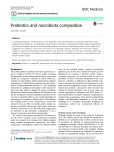-
Články
- Časopisy
- Kurzy
- Témy
- Kongresy
- Videa
- Podcasty
Probiotics and microbiota composition
Accumulated evidence, corroborated by a new systematic review by Kristensen et al. (Genome Med 8 : 52, 2016), suggests that probiotics do not significantly impact the fecal microbiota composition of healthy subjects. Nevertheless, physiological benefits have been associated with probiotic consumption by healthy people. Some studies have suggested that probiotics may impact the function of colonizing microbes, although this needs to be further studied. An alternative hypothesis is that probiotics may promote homeostasis of the gut microbiota, rather than change its composition. This hypothesis warrants investigation as a possible mechanism for how probiotics may benefit healthy people.
Please see related article: http://genomemedicine.biomedcentral.com/articles/10.1186/s13073-016-0300-5.Keywords:
Probiotic, Lactobacillus, Homeostasis, Gut microbiota, Metagenomics
Autoři: Mary Ellen Sanders
Vyšlo v časopise: BMC Medicine 2016, 14:82
Kategorie: Commentary
prolekare.web.journal.doi_sk: https://doi.org/10.1186/s12916-016-0629-z© 2016 The Author(s). Open Access This article is distributed under the terms of the Creative Commons Attribution 4.0 International License (http://creativecommons.org/licenses/by/4.0/), which permits unrestricted use, distribution, and reproduction in any medium, provided you give appropriate credit to the original author(s) and the source, provide a link to the Creative Commons license, and indicate if changes were made. The Creative Commons Public Domain Dedication waiver (http://creativecommons.org/publicdomain/zero/1.0/) applies to the data made available in this article, unless otherwise stated.
The electronic version of this article is the complete one and can be found online at: https://bmcmedicine.biomedcentral.com/articles/10.1186/s12916-016-0629-zSouhrn
Accumulated evidence, corroborated by a new systematic review by Kristensen et al. (Genome Med 8 : 52, 2016), suggests that probiotics do not significantly impact the fecal microbiota composition of healthy subjects. Nevertheless, physiological benefits have been associated with probiotic consumption by healthy people. Some studies have suggested that probiotics may impact the function of colonizing microbes, although this needs to be further studied. An alternative hypothesis is that probiotics may promote homeostasis of the gut microbiota, rather than change its composition. This hypothesis warrants investigation as a possible mechanism for how probiotics may benefit healthy people.
Please see related article: http://genomemedicine.biomedcentral.com/articles/10.1186/s13073-016-0300-5.Keywords:
Probiotic, Lactobacillus, Homeostasis, Gut microbiota, Metagenomics
Zdroje
1. Lau CS, Chamberlain RS. Probiotic administration can prevent necrotizing enterocolitis in preterm infants: a meta-analysis. J Pediatr
Surg. 2015;50(8):1405–12.
2. Harb T, Matsuyama M, David M, Hill RJ. Infant colic-what works: a systematic review of interventions for breast-fed infants. J Pediatr Gastroenterol Nutr. 2016;62(5):668–86.
3. Szajewska H, Skorka A, Ruszczynski M, Gieruszczak-Bialek D. Meta-analysis: Lactobacillus GG for treating acute gastroenteritis in children–updated analysis of randomised controlled trials. Aliment Pharmacol Ther. 2013;38(5):467–76.
4. Didari T, Mozaffari S, Nikfar S, Abdollahi M. Effectiveness of probiotics in irritable bowel syndrome: updated systematic review with meta-analysis. World J Gastroenterol. 2015;21(10):3072–84.
5. Goldenberg JZ, Lytvyn L, Steurich J, Parkin P, Mahant S, Johnston BC. Probiotics for the prevention of pediatric antibiotic-associated diarrhea. Cochrane Database Syst Rev. 2015;12:CD004827.
6. Kristensen NB, Bryrup T, Allin KH, Nielsen T, Hansen TH, Pedersen O. Alterations in fecal microbiota composition by probiotic supplementation in healthy adults: a systematic review of randomized controlled trials. Genome Med. 2016;8 : 52.
7. Sanders ME. Impact of probiotics on colonizing microbiota of the gut. J Clin Gastroenterol. 2011;45(Suppl):S115–9.
8. Eloe-Fadrosh EA, Brady A, Crabtree J, Drabek EF, Ma B, Mahurkar A, Ravel J, Haverkamp M, Fiorino AM, Botelho C, et al. Functional dynamics of the gut microbiome in elderly people during probiotic consumption. MBio. 2015;6(2):e00231–15. doi:10.1128/mBio.00231-15.
9. McNulty NP, Yatsunenko T, Hsiao A, Faith JJ, Muegge BD, Goodman AL, Henrissat B, Oozeer R, Cools-Portier S, Gobert G, et al. The impact of a consortium of fermented milk strains on the gut microbiome of gnotobiotic mice and monozygotic twins. Sci Transl Med. 2011;3(106):106ra106.
10. Falony G, Joossens M, Vieira-Silva S, Wang J, Darzi Y, Faust K, Kurilshikov A, Bonder MJ, Valles-Colomer M, Vandeputte D, et al. Population-level analysis of gut microbiome variation. Science. 2016;352(6285):560–4.
11. Backhed F, Fraser CM, Ringel Y, Sanders ME, Sartor RB, Sherman PM, Versalovic J, Young V, Finlay BB. Defining a healthy human gut microbiome: current concepts, future directions, and clinical applications. Cell Host Microbe. 2012;12(5):611–22.
12. Sanders ME, Heimbach JT, Pot B, Tancredi DJ, Lenoir-Wijnkoop I, Lahteenmaki-Uutela A, Gueimonde M, Banares S. Health claims substantiation for probiotic and prebiotic products. Gut Microbes. 2011;2(3):127–33.
13. Engelbrektson A, Korzenik JR, Pittler A, Sanders ME, Klaenhammer TR, Leyer G, Kitts CL. Probiotics to minimize the disruption of faecal microbiota in healthy subjects undergoing antibiotic therapy. J Med Microbiol. 2009;58(Pt 5):663–70.
Článok vyšiel v časopiseBMC Medicine
Najčítanejšie tento týždeň
2016 Číslo 82- Metamizol jako analgetikum první volby: kdy, pro koho, jak a proč?
- fSCIG v reálnej klinickej praxi u pacientov s hematologickými malignitami
- Komunikační karty v přednemocniční neodkladné péči
- Masturbační chování žen v ČR − dotazníková studie
- Nejasný stín na plicích – kazuistika
Najčítanejšie v tomto čísle
Prihlásenie#ADS_BOTTOM_SCRIPTS#Zabudnuté hesloZadajte e-mailovú adresu, s ktorou ste vytvárali účet. Budú Vám na ňu zasielané informácie k nastaveniu nového hesla.
- Časopisy



